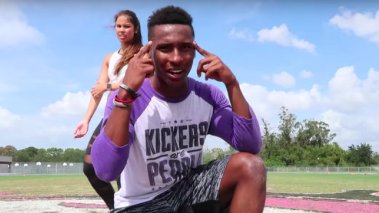Table of Contents
Former University of Central Florida kicker scores courtroom win in YouTube case

A Florida judge ruled this week that a lawsuit by former University of Central Florida football player and popular YouTuber Donald De La Haye against UCF may proceed because he has a plausible First Amendment claim.
De La Haye sued UCF back in January, alleging the university violated his First Amendment rights when it rescinded his full athletic scholarship over the income De La Haye made from his monetized YouTube channel, which he started before he attended college. UCF argued De La Haye violated the NCAA policy forbidding student-athletes from using their likenesses to make money.
On Tuesday, United States District Court Judge Anne Conway ruled De La Haye’s First Amendment claim — that UCF engaged in content-based discrimination against him — was plausible and survives UCF’s motion to dismiss the lawsuit.
“In his Complaint, Plaintiff details how UCF canceled his scholarship and removed him from the football team based on his YouTube channel being monetized and the content of the speech in his videos, such as his discussion of his life as a student-athlete,” Conway wrote. “At this stage, these allegations are sufficient to withstand the Motion to Dismiss.”
FIRE routinely cites the NCAA’s own description of student-athletes — that they are “students first, athletes second” — in arguing that student-athletes should maintain the robust free speech rights that other students possess. While allowing for reasonable restrictions on expressive activity necessary for the regular functioning of athletic programs, colleges and universities should strive to uphold their athletes’ expressive rights to the fullest possible extent.
Here, De La Haye argues UCF went too far in citing NCAA rules to demand he take down his YouTube channel, which he began in 2011, well before his time at UCF. Some of De La Haye’s most popular videos tally more than 1 million views apiece and feature De La Haye and his friends showing off football kicking and catching skills, playing tackle football on a Slip ’N Slide, or running a 40-yard dash. The channel has nearly 700,000 subscribers.

The NCAA is currently facing several new lawsuits over the issue of student-athlete compensation.
University agreements with private organizations like the NCAA must not be allowed to override the Constitution or the promises of free expression that are crucial to the enterprise of liberal education. Students, including student-athletes, must continue to have the right to express themselves. We hope the court in De La Haye’s case will take this opportunity to begin to strike a reasonable balance with respect to student-athletes’ speech rights — a balance that should allow them to play college sports without having to forgo their most basic civil liberties.
Recent Articles
FIRE’s award-winning Newsdesk covers the free speech news you need to stay informed.

A third of Stanford students say using violence to silence speech can be acceptable

Stanford president and provost cheer free expression in open letter to incoming class

FIRE survey shows Judge Duncan shoutdown had ‘chilling effect’ on Stanford students
